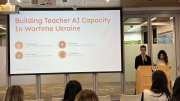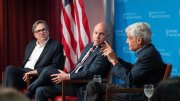After a tumultuous fall 2023 semester, Harvard turned its attention toward difficult conversations. How can students feel comfortable discussing controversial events? Why are students reluctant to express disagreement in and out of the classroom? In April, then-interim President Alan Garber and then-interim Provost John Manning convened the Open Inquiry and Constructive Dialogue Working Group. On Tuesday, the group released its report.
It begins by establishing candid conversations as an important University value. “Open inquiry and constructive dialogue,” it reads, “are essential to the pursuit of academic excellence at Harvard and throughout higher education.”
But those candid conversations often do not happen. The task force described a chilled speech environment on campus. Some 45 percent of surveyed students said they were “reluctant to share their views about charged topics in class.” Students feared judgment from peers, criticism on social media, reputational damage, and bullying.
Faculty and instructors—especially those without tenure—also express hesitation about discussing controversial topics. Though 59 percent of surveyed faculty and instructors said they would research controversial issues, only 49 percent feel comfortable leading a classroom discussion, and only 32 percent feel comfortable talking about such issues outside the classroom. Many feared damage to their professional standing through negative course reviews, contract nonrenewal, social media criticism, and formal complaints about bullying.
Fear about engaging in controversial speech is not unique to the University. “Extreme political polarization, enduring social divisions, and the impacts of social media on human behavior inform and shape on-campus dynamics,” the working group wrote.
Their report suggests that the University and its representatives should broadcast the institution’s interest in fostering dialogue across difference. It recommends that the College institute a required first-year module about constructive disagreement, perhaps to be taught through the required Expository Writing courses. It suggests that course instructors publicize “their commitment to open inquiry” on their syllabi. And it calls for schools to “recognize and support educators, including untenured faculty…who are skilled facilitators of controversial subjects.”
Some University stakeholders, such as Ford Foundation professor of democracy and governance Tarek Masoud, have argued that the best way to have hard conversations on campus is just to have them. But task force co-chair Eric Beerbohm, director of the Safra Center for Ethics and faculty dean of Quincy House, has found that students and faculty believe “these skills are not naturally occurring,” he said. “Most of us in our disciplines aren’t taught how to get…across difference.”
Beerbohm hoped that the report will inspire action, not just preach values. He described the working group members as “cross-pollinators,” searching for promising speech initiatives at different Harvard schools and sharing successful techniques with the broader University. Radcliffe Dean Tomiko Brown-Nagin, who co-chaired the group, noted that by design, some schools have more robust discourse curriculums than others. (Lawyers will encounter adversarial arguments in their profession more frequently than dentists.) Some highlighted policies from the professional schools include Harvard Business School’s guide to managing challenging moments in the classroom and Harvard Law School’s policy on personal narratives in classroom discussions (some professors discourage students from buttressing arguments with personal ties).
The working group was especially interested in the Chatham House Rule, which allows students to share what was said in a class with others so long as they do not reveal who said it. The Business, Law, and Kennedy schools already have instituted such policies. Non-attribution policies aim to help students feel as though the stakes of classroom discussions are lower. Such rules, said Beerbohm, “empower students to attend to an idea that may not be their own, but they’re just testing it out.”
The group also wanted to find ways to mitigate the pressures of the outside world. They recommended that the University “enact policies that promote responsible social media use.” The Business and Law schools ban social media use during class. The Kennedy School discourages the use of technology for personal purposes during class.
Brown-Nagin and Beerbohm are hopeful that the report can help facilitate difficult conversations on campus. Students, Brown-Nagin said, “want to be good University citizens. They just need some help with that.”
In a message to the Harvard community, Garber and Manning accepted the recommendations of the working group and said they “look forward to working with the deans, faculty, staff, and students to put them into practice.”
Though this report seeks to broaden the speech environment on campus, it will have to work alongside new restrictions on campus rhetoric. Last week, the University elaborated on its institutional voice policy, which prevents Harvard and its leaders from making official statements about public matters not directly affecting core academic functions.
During an interview with Harvard Magazine about the open inquiry report, Brown-Nagin discussed the upcoming anniversary of Hamas’s October 7 attack, which sparked the present war in the Middle East and began the turmoil that shook this and other campuses last year. “The open inquiry work could move us toward a better way of talking about the very painful, difficult issues related to the conflict in Israel and Gaza,” she said. “Few of us have been unmoved or untouched by the events of the past year, and I’m sure that the pain will be deeply felt on October 7.” Brown-Nagin did not take a stance on the conflict—doing so, as former President Claudine Gay did last October, would violate the new institutional voice policy.
But did this vague reference to the war in the Middle East and its impact on campus abide by the guidance of the institutional voice policy? The new policy states that leaders are instructed not to “issue public statements on natural disasters, acts of mass violence, or other events capturing significant public attention unless they also raise issues concerning core University functions.” Does a comment like Brown-Nagin’s, which does not promote any specific opinion but simply acknowledges a painful event, constitute a public statement?
A Harvard spokesperson said that her comment does abide by the policy. “Her comments—during an interview on how to improve open dialogue on campus—do not take a position on an ongoing current global issue but rather acknowledge from an individual perspective that the ongoing conflict is being felt by members of our community as both painful and difficult for many in the University community,” wrote assistant director for media relations and communications Sarah Kennedy O’Reilly. The institutional voice guidance, she continued, “leaves space for connecting members of our community with resources. I think it’s fair to point to opportunities for constructive dialogue as a resource for the community.”
In the coming months, Harvard will have to figure out how to implement these dual sets of policies and recommendations—one that encourages discussion about controversial topics, and another that restricts leaders from commenting on them.









